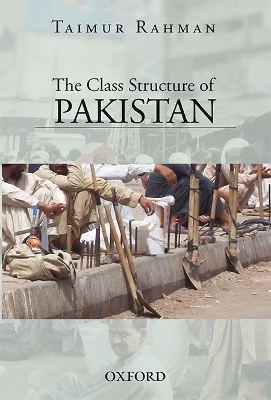
Class Structure of Pakistan
Seiten
2022
Oxford University Press (Verlag)
978-0-19-940012-6 (ISBN)
Oxford University Press (Verlag)
978-0-19-940012-6 (ISBN)
This work examines Pakistan's class structure through historical materialism, tracing from Mughal Empire to contemporary times. It argues for a unique form of capitalism termed Asiatic capitalism, highlighting dominance of petty commodity production. Implications for politics, society, and culture are discussed.
This work on the class structure of Pakistan is based on the framework of historical materialism. It sketches the history of the region that is now Pakistan and analyzes the class structure from the time of the Mughal Empire, through the distortions of the colonial era and the transition to capitalism, to the class structure of contemporary Pakistan. It avoids over-schematic arguments, attempting to proceed from facts rather than from any ideal forms. The study develops three propositions: First, that the mode of production of pre-colonial South Asia was qualitatively distinct from European feudalism; second, that the colonial path of capitalist development of South Asia resulted in a socio-economic formation that combined features of the Asiatic and capitalist modes of production, which this study terms Asiatic capitalism; third, that in Pakistan manufacturing and services are dominated by petty commodity production and small-scale capitalism. The author concludes by outlining the implications for Pakistan's politics, society, and culture.
This work on the class structure of Pakistan is based on the framework of historical materialism. It sketches the history of the region that is now Pakistan and analyzes the class structure from the time of the Mughal Empire, through the distortions of the colonial era and the transition to capitalism, to the class structure of contemporary Pakistan. It avoids over-schematic arguments, attempting to proceed from facts rather than from any ideal forms. The study develops three propositions: First, that the mode of production of pre-colonial South Asia was qualitatively distinct from European feudalism; second, that the colonial path of capitalist development of South Asia resulted in a socio-economic formation that combined features of the Asiatic and capitalist modes of production, which this study terms Asiatic capitalism; third, that in Pakistan manufacturing and services are dominated by petty commodity production and small-scale capitalism. The author concludes by outlining the implications for Pakistan's politics, society, and culture.
Dr Taimur Rahman teaches Political Science at the Lahore University of Management Sciences (LUMS). He has an MA from University of Sussex and a PhD from the School of Oriental and African Studies (SOAS), University of London. He is a Socialist Political activist and is the General Secretary of the Mazdoor Kisan Party of Pakistan. He is also the spokesperson of the popular band called Laal.
| Erscheinungsdatum | 25.05.2016 |
|---|---|
| Verlagsort | Oxford |
| Sprache | englisch |
| Maße | 156 x 233 mm |
| Themenwelt | Geisteswissenschaften ► Geschichte ► Regional- / Ländergeschichte |
| Sozialwissenschaften ► Ethnologie | |
| Sozialwissenschaften ► Politik / Verwaltung | |
| Sozialwissenschaften ► Soziologie | |
| Wirtschaft ► Volkswirtschaftslehre ► Makroökonomie | |
| Wirtschaft ► Volkswirtschaftslehre ► Wirtschaftspolitik | |
| ISBN-10 | 0-19-940012-1 / 0199400121 |
| ISBN-13 | 978-0-19-940012-6 / 9780199400126 |
| Zustand | Neuware |
| Haben Sie eine Frage zum Produkt? |
Mehr entdecken
aus dem Bereich
aus dem Bereich
Erinnerungen
Buch | Softcover (2024)
Pantheon (Verlag)
16,00 €
Universalgelehrter, Polarreisender, Entdecker
Buch | Hardcover (2024)
mareverlag
28,00 €


